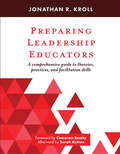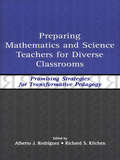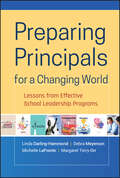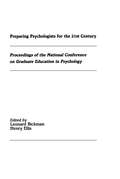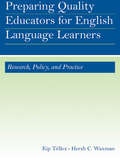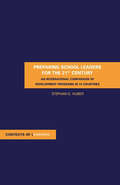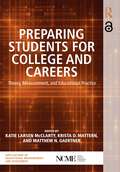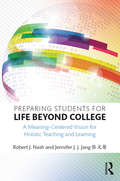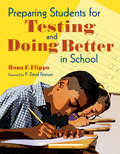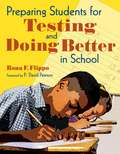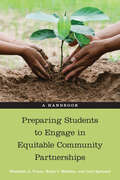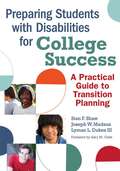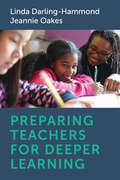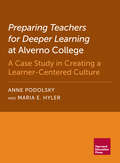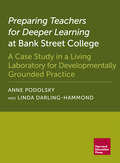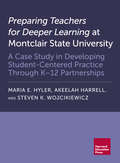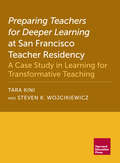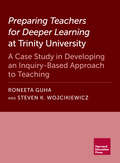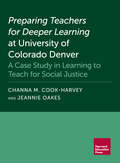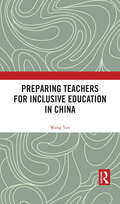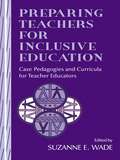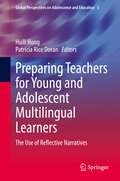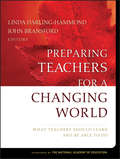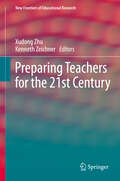- Table View
- List View
Preparing Leadership Educators: A Comprehensive Guide to Theories, Practices, and Facilitation Skills
by Jonathan R. KrollThis comprehensive and integrated resource prepares leadership educators to develop their training and facilitation practice that is informed by theory, imbued with healthy leadership habits, and imparted with time-tested facilitation techniques—particularly experiential learning and reflective dialogue.There are plenty of resources for those who desire to practice leadership more effectively. What has been absent until now is an extensive and accessible compilation of resources and preparatory materials for those who facilitate the leadership training and development of others. Leadership educators are responsible for preparing the next generations of change-makers to develop the leadership skills and capacities they need to navigate the challenges in the decades ahead. They engage organizations and communities to become the holding environments and learning laboratories that empower connections of meaning and depth, embolden courageous exploration, and enable needed structural and systemic change. Jonathan Kroll offers this book as a resource to help readers become exceptional leadership educators—those who can empower others to enhance their leadership skills, capacities, and efficacy.Designed to prepare those who are charged with the leadership training and development of others, this book includes: two dozen leadership theories, models, frameworks, and topics; an extensive collection of leadership practices; and tactics for facilitating powerful training experiences that are infused with experiential learning activities and reflective dialogue. Included with each theory and practice (40+) are detailed and easy-to-follow instructions on how to facilitate specific experiential learning activities—along with go-to reflective dialogue questions—that bring the topics to life and ensure this book serves as a practical resource.
Preparing Mathematics and Science Teachers for Diverse Classrooms: Promising Strategies for Transformative Pedagogy
by Alberto J. Rodriguez Richard S. KitchenThis book provides a theoretical basis and practical strategies to counter resistance to learning to teach for diversity (in culturally and gender-inclusive ways), and resistance to teaching for understanding (using student-centered and inquiry-based pedagogical approaches). Teacher educators from across the United States present rich narratives of their experiences in helping prospective and practicing teachers learn to teach for diversity and for understanding in a variety of mathematics and science contexts. Mathematics and science education has been slow to respond to issues of diversity and equity. Preparing Mathematics and Science Teachers for Diverse Classrooms: Promising Strategies for Transformative Pedagogy helps to begin a network for support and collaboration among teacher educators in science and mathematics who work for multicultural education and equity. A unique and much-needed contribution, this book is an essential resource for teacher educators, K-12 teachers who work as student teacher supervisors and cooperating teachers, and graduate students in mathematics and science education, and a compelling text for science and mathematics methods courses.
Preparing Principals for a Changing World
by Linda Darling-Hammond Michelle Lapointe Debra Meyerson Margaret T. OrrPreparing Principals for a Changing World provides a hands-on resource for creating and implementing effective policies and programs for developing expert school leaders. Written by acclaimed author and educator Linda Darling-Hammond and experts Debra Meyerson, Michelle LaPointe, and Margaret Terry Orr, this important book examines the characteristics of successful educational leadership programs and offers concrete recommendations to improve programs nationwide.In a study funded by the Wallace Foundation, Darling-Hammond and the team examined eight exemplary principal development programs, as well as state policies and principals' experiences across the country. Using the data from the study, they reveal how successful programs are structured, the skills and knowledge participants gain, and what they are able to do in practice as school leaders as a result.What do these exemplary programs have in common? Aggressive recruitment; close ties with schools in the community; on-the-ground training under the wing of expert principals, and a strong emphasis on the cutting-edge theories of instructional and transformational leadership.In addition to highlighting the programs' similarities, the study also explains the differences among the programs and sheds light on the effectiveness of approaches and models from different states and contexts?East, West, North, and South; urban and rural; pre-service and in-service. The authors analyze program outcomes for principals and their schools, including illustrative case studies and educators' voices on the influence of programs' strategies for recruitment, internships, mentoring, and coursework.The ideas and suggestions outlined in Preparing Principals for a Changing World are presented with the goal of increasing the number of highly qualified, thoughtful, and innovative educational leaders.
Preparing Psychologists for the 21st Century: Proceedings of the National Conference on Graduate Education in Psychology
by Leonard Bickman Henry EllisSponsored by the American Psychological Association, this is a representation of the proceedings of the National Conference on Graduate Education in Psychology. The proceedings begin with general introductory material, after which ten major issues are presented and discussed, answering such questions as: How can science and practice be combined? Should there be a core or individualized curriculum? What are the implications of the institutional and organizational setting? Are programs responsible for the marketability of their graduates? Major themes cutting across many presentations and recommendations include: the perceived unity or disunity of psychology as it is taught and as it organizationally exists; the acceptance and encouragement of diversity within a unified discipline; the quality of graduate education and its students; and recognition that graduate education involves people as well as curricula. Since the issues covered are of great concern to scientists, health service providers and educators alike, this book should have a significant impact on the field.
Preparing Quality Educators for English Language Learners: Research, Policy, and Practice
by Kip Téllez Hersh C. WaxmanThis volume brings together a broad range of academics, school-based educators, and policymakers to address research, policy, and practice issues related to improving the education of English language learners in U.S. schools today. It emphasizes throughout that instructional improvements cannot be achieved via curriculum alone--teachers are key to improving the education of this large and growing population of students. The focus is on the quality of preparation and development of pre-service and in-service educators.Contributors include leading educators and researchers in the field and from nationally recognized professional development programs. Their recommendations range from promising new professional development practices to radical changes in current state and federal policy.Preparing Quality Educators for English Language Learners is an important resource to help teacher educators, administrators, and policymakers address critical issues as they develop programs for English language learners.
Preparing School Leaders for the 21st Century (Contexts of Learning)
by Stephan Gerhard HuberThe quality and success of schools depend upon school leadership. Increasingly, in many countries worldwide, this belief has led to designing and implementing appropriate training and development programs for educational leaders. In an international comparative research project, current school leader training and development programs in fiftee
Preparing Students for College and Careers: Theory, Measurement, and Educational Practice
by Katie Larsen McClarty Krista D. Mattern Matthew N. GaertnerPreparing Students for College and Careers addresses measurement and research issues related to college and career readiness. Educational reform efforts across the United States have increasingly taken aim at measuring and improving postsecondary readiness. These initiatives include developing new content standards, redesigning assessments and performance levels, legislating new developmental education policy for colleges and universities, and highlighting gaps between graduates’ skills and employers’ needs. In this comprehensive book, scholarship from leading experts on each of these topics is collected for assessment professionals and for education researchers interested in this new area of focus. Cross-disciplinary chapters cover the current state of research, best practices, leading interventions, and a variety of measurement concepts, including construct definitions, assessments, performance levels, score interpretations, and test uses.
Preparing Students for Life Beyond College: A Meaning-Centered Vision for Holistic Teaching and Learning
by Robert J. Nash Jennifer J.J. Jang 張文馨At a time when STEM research and new technologies are dominating the curricula of colleges and universities, this important book refocuses the conversation on holistic education for all students. Organized around the most important and difficult questions that students face, Preparing Students for Life Beyond College explores a vision of education that will enable students to talk about universal issues openly and honestly, preparing them for life beyond their formal education. Featuring a variety of traditional and innovative pedagogies, strategies, recommendations, and case studies, this practical resource provides student affairs practitioners and higher education faculty in a variety of disciplines with concrete approaches for developing campuses and classes that encourage critical thinking and reflection. This exciting book prepares colleges and universities to help students create meaning in their lives—no matter the discipline, campus location or delivery system.
Preparing Students for Testing and Doing Better in School
by Rona F. FlippoImprove students' test-taking success by teaching effective time management strategies, organizational skills, note-taking techniques, ways to handle test anxiety, and methods for taking essay and objective tests.
Preparing Students for Testing and Doing Better in School
by Rona F. FlippoHelp students master test taking through preparation strategies that lead to academic success!As the stakes on high-profile student tests such as the SAT continue to rise, student preparedness is becoming increasingly important. As a result, helping students do well on tests and succeed in school has become a top priority for teachers. This indispensable guide responds to this need by providing resources to promote content learning and test-taking abilities in middle and secondary school students.This practical text provides charts, checklists, Internet resources, and sample exercises for teachers to use with students, plus a final test covering content from each chapter. Using research-based practices, educators will be able to help students develop Strategies for dealing with test anxiety Effective time management and organizational skills Note-taking and study techniques applicable across content areas Methods for taking essay and objective testsTests are often a source of anxiety for students and teachers alike, but they don't have to be! Use these proven tools and strategies to help your students develop the skills and confidence that lead to positive academic experiences.
Preparing Students to Engage in Equitable Community Partnerships: A Handbook
by Elizabeth A. Tryon Haley Madden Cory SprinkelWhen done properly, community engagement in academia can have value for all stakeholders. Authentic experiences are more useful for students; faculty can add new knowledge to the field and their own toolbelts; and communities feel their investment has generated a useful deliverable or even a long-term partnership. Preparing Students to Engage in Equitable Community Partnerships provides a wealth of valuable resources and activities to help impart ideas of identity, privilege, oppression, bias, and power dynamics to best support students and community in these relationships. Believing that authenticity only comes about in an atmosphere of mutual respect and self-awareness, the authors argue for cultural and intellectual humility. Each chapter looks at topics and issues through different lenses, complete with underlying theories, and relates those discussions to concrete classroom activities, facilitation strategies, and scholarly frames. In addition, the authors include contributions from a diverse group of practitioners at community colleges, private colleges, historically Black colleges and universities, and minority-serving institutions. Preparing Students to Engage in Equitable Community Partnerships is a much-needed, comprehensive resource for community-engaged professionals as they prepare students for building relationships when entering a community for learning or research purposes.
Preparing Students with Disabilities for College Success: A Practical Guide to Transition Planning
by Joseph W. Madaus Stan F. Shaw Lyman L DukesFor students with mild to moderate, non-visible disabilities, navigating a college education without the support team they had in high school can be challenging. Help students become effective self-advocates and maximize their postsecondary possibilities with this cutting-edge book, which balances current research with the most practical guidance to date on this topic.
Preparing Teachers for Deeper Learning
by Jeannie Oakes Linda Darling-HammondPreparing Teachers for Deeper Learning answers an urgent call for teachers who educate children from diverse backgrounds to meet the demands of a changing world. In today&’s knowledge economy, teachers must prioritize problem-solving ability, adaptability, critical thinking, and the development of interpersonal and collaborative skills over rote memorization and the passive transmission of knowledge. Authors Linda Darling-Hammond and Jeannie Oakes and their colleagues examine what this means for teacher preparation and showcase the work of programs that are educating for deeper learning, equity, and social justice. Guided by the growing knowledge base in the science of learning and development, the book examines teacher preparation programs at Alverno College, Bank Street College of Education, High Tech High&’s Intern Program, Montclair State University, San Francisco Teacher Residency, Trinity University, and University of Colorado Denver. These seven programs share a common understanding of how people learn that shape similar innovative practices. With vivid examples of teaching for deeper learning in coursework and classrooms; interviews with faculty, school partners, and novice teachers; surveys of teacher candidates and graduates; and analyses of curriculum and practices, Preparing Teachers for Deeper Learning depicts transformative forms of teaching and teacher preparation that honor and expand all students&’ abilities, knowledges, and experiences, and reaffirm the promise of educating for a better world.
Preparing Teachers for Deeper Learning at Alverno College: A Case Study in Creating a Learner-Centered Culture
by Maria E. Hyler Anne PodolskyThe Alverno College case is one of seven that form the basis for the arguments and analyses presented in Preparing Teachers for Deeper Learning. Each case outlines the context, vision, and practices guiding a particular program&’s enactment, and includes sample curricula, assessment and feedback forms, and the program details that have contributed to its success. The cases are valuable reading for educators involved in developing teacher candidates who are self-directed, collaborative, social justice–focused, and prepared to meet the needs of today&’s students and a changing society.
Preparing Teachers for Deeper Learning at Bank Street College: A Case Study in a Living Laboratory for Developmentally Grounded Practice
by Linda Darling-Hammond Anne PodolskyThe Bank Street College case is one of seven that form the basis for the arguments and analyses presented in Preparing Teachers for Deeper Learning. Each case outlines the context, vision, and practices guiding a particular program&’s enactment, and includes sample curricula, assessment and feedback forms, and the program details that have contributed to its success. The cases are valuable reading for educators involved in developing teacher candidates who are self-directed, collaborative, social justice–focused, and prepared to meet the needs of today&’s students and a changing society.
Preparing Teachers for Deeper Learning at High Tech High: A Case Study in Building a Project-Based Learning Environment
by Steven K. Wojcikiewicz Akeelah Harrell Charmaine N. Jackson MercerThe High Tech High case is one of seven that form the basis for the arguments and analyses presented in Preparing Teachers for Deeper Learning. Each case outlines the context, vision, and practices guiding a particular program&’s enactment, and includes sample curricula, assessment and feedback forms, and the program details that have contributed to its success. The cases are valuable reading for educators involved in developing teacher candidates who are self-directed, collaborative, social justice–focused, and prepared to meet the needs of today&’s students and a changing society.
Preparing Teachers for Deeper Learning at Montclair State University: A Case Study in Developing Student-Centered Practice Through K-12 Partnerships
by Steven K. Wojcikiewicz Maria E. Hyler Akeelah HarrellThe Montclair State University case is one of seven that form the basis for the arguments and analyses presented in Preparing Teachers for Deeper Learning. Each case outlines the context, vision, and practices guiding a particular program&’s enactment, and includes sample curricula, assessment and feedback forms, and the program details that have contributed to its success. The cases are valuable reading for educators involved in developing teacher candidates who are self-directed, collaborative, social justice–focused, and prepared to meet the needs of today&’s students and a changing society.
Preparing Teachers for Deeper Learning at San Francisco Teacher Residency: A Case Study in Learning for Transformative Teaching
by Steven K. Wojcikiewicz Tara KiniThe San Francisco Teacher Residency case is one of seven that form the basis for the arguments and analyses presented in Preparing Teachers for Deeper Learning. Each case outlines the context, vision, and practices guiding a particular program&’s enactment, and includes sample curricula, assessment and feedback forms, and the program details that have contributed to its success. The cases are valuable reading for educators involved in developing teacher candidates who are self-directed, collaborative, social justice–focused, and prepared to meet the needs of today&’s students and a changing society.
Preparing Teachers for Deeper Learning at Trinity University: A Case Study in Developing an Inquiry-Based Approach to Teaching
by Roneeta Guha Steven K. WojcikiewiczThe Trinity University case is one of seven that form the basis for the arguments and analyses presented in Preparing Teachers for Deeper Learning. Each case outlines the context, vision, and practices guiding a particular program&’s enactment, and includes sample curricula, assessment and feedback forms, and the program details that have contributed to its success. The cases are valuable reading for educators involved in developing teacher candidates who are self-directed, collaborative, social justice–focused, and prepared to meet the needs of today&’s students and a changing society.
Preparing Teachers for Deeper Learning at University of Colorado Denver: A Case Study in Learning to Teach for Social Justice
by Jeannie Oakes Channa M. Cook-HarveyThe University of Colorado Denver case is one of seven that form the basis for the arguments and analyses presented in Preparing Teachers for Deeper Learning. Each case outlines the context, vision, and practices guiding a particular program&’s enactment, and includes sample curricula, assessment and feedback forms, and the program details that have contributed to its success. The cases are valuable reading for educators involved in developing teacher candidates who are self-directed, collaborative, social justice–focused, and prepared to meet the needs of today&’s students and a changing society.
Preparing Teachers for Inclusive Education in China
by Wang YanFocusing on the competence of teachers that underpins inclusive education seeking equal access to education for special needs children, this title examines teacher competence cultivation based on examples in China and excellent international experience. To give a clear picture of the context of inclusive education in China, the author first clarifies the relevant concepts and reviews the evolving policies and practices embodied in the “Learning in Regular Classrooms (LRC)” program. The study then constructs an analytical model of four key indicators that help evaluate the competence of teachers in inclusive education. Based on analysis of the influencing factors of teacher competence, the book elucidates how these factors work to determine teacher competence. Drawing on international experience, especially pre-service teacher cultivation in the US and in-service training in China, it introduces three major cultivation models and feasible suggestions and strategies to improve the competence of teachers in inclusion. This book will benefit researchers, professionals, and policymakers interested in inclusive education, special education, and teacher education.
Preparing Teachers for Inclusive Education: Case Pedagogies and Curricula for Teacher Educators
by Suzanne E. WadeThis book--a companion volume to Inclusive Education: A Casebook and Readings for Prospective and Practicing Teachers--is designed to assist instructors in using Inclusive Education as a text for preservice or in-service teacher education courses. Part I (Chapters 1-5) of Preparing Teachers for Inclusive Education provides a general introduction to case pedagogies and chapters describing curricula that teacher educators have developed using cases designed to prepare teachers for inclusive education. Part II provides Teaching Notes that correspond to the 14 cases in Inclusive Education.
Preparing Teachers for Young and Adolescent Multilingual Learners: The Use of Reflective Narratives (Global Perspectives on Adolescence and Education #3)
by Patricia Rice Doran Huili HongMultilingual learners (MLs) students spend most of their school time with their teachers, who often feel professionally unprepared to meet their linguistically diverse students' needs. As such, preparing teachers for increasing numbers of multilingual learners (MLs) has become a critical factor in promoting equity and success for all students in our global society. This book explores and highlights the reflective narratives of teacher educators, in-service, and preservice teachers. It shows how these narratives are grounded in their personal lives, professional training, and daily teaching, and how they can unfold the complexities in their various experiences and the rich implications for MLs teaching and teacher preparation. The book presents papers that utilize teachers' reflective narratives to prepare and train teachers who are or will be working with MLs. It discusses the challenges and implications of teaching groups of MLs made up of diverse learners, including immigrants, refugees, and learners with disabilities. 'This book seeks to change the narrative of some of our most vulnerable student populations by giving voice to the experiences, challenges, success, and best practices encountered in the international education landscape. The power contained within each chapter is the systematic and intentional reflections that bring the marginalized stories to the center of the discussion. Anyone seeking an understanding of how reflective narrative can build equity and social justice for multilingual learners will appreciate the breadth of experience described. This understanding is critical for culturally and linguistically diverse teaching and learning.' Jordan González, Ph.D., St. John's University, NY
Preparing Teachers for a Changing World: What Teachers Should Learn and Be Able to Do
by Linda Darling-Hammond John BransfordBased on rapid advances in what is known about how people learn and how to teach effectively, this important book examines the core concepts and central pedagogies that should be at the heart of any teacher education program. Stemming from the results of a commission sponsored by the National Academy of Education, Preparing Teachers for a Changing World recommends the creation of an informed teacher education curriculum with the common elements that represent state-of-the-art standards for the profession. Written for teacher educators in both traditional and alternative programs, university and school system leaders, teachers, staff development professionals, researchers, and educational policymakers, the book addresses the key foundational knowledge for teaching and discusses how to implement that knowledge within the classroom. Preparing Teachers for a Changing World recommends that, in addition to strong subject matter knowledge, all new teachers have a basic understanding of how people learn and develop, as well as how children acquire and use language, which is the currency of education. In addition, the book suggests that teaching professionals must be able to apply that knowledge in developing curriculum that attends to students' needs, the demands of the content, and the social purposes of education: in teaching specific subject matter to diverse students, in managing the classroom, assessing student performance, and using technology in the classroom.
Preparing Teachers for the 21st Century
by Xudong Zhu Kenneth ZeichnerThis book addresses two main questions, namely how to prepare high-quality teachers in the 21st century and how the East and the West can learn from each other. It addresses the different challenges and dilemmas that eastern countries, especially China, and western countries are facing with regard to teacher education. We explore the question by examining teacher education research, practice and policy in different countries, identifying both common problems and country-specific challenges. We then try to find valuable experiences, theories and practice which can solve specific problems in the process of teacher education, also addressing how local and global factors impact it. In this regard, our approach does not strictly separate pre-service teacher education from teachers' in-service professional development, adopting an integrative perspective. Further, we believe the respective social and cultural contexts must also be taken into account. Lastly, we call for teachers' knowledge and individual character traits to be accounted for in the education of high-quality teachers.
